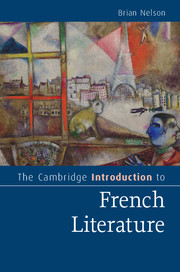Book contents
- Frontmatter
- Dedication
- Contents
- Preface
- Acknowledgements
- Chronology
- 1 Villon: a dying man
- 2 Rabelais: the uses of laughter
- 3 Montaigne: self-portrait
- 4 Corneille: heroes and kings
- 5 Racine: in the labyrinth
- 6 Molière: new forms of comedy
- 7 La Fontaine: the power of fables/fables of power
- 8 Madame de Lafayette: the birth of the modern novel
- 9 Voltaire: the case for tolerance
- 10 Rousseau: man of feeling
- 11 Diderot: the enlightened sceptic
- 12 Laclos: dangerous liaisons
- 13 Stendhal: the pursuit of happiness
- 14 Balzac: ‘All is true’
- 15 Hugo: the divine stenographer
- 16 Baudelaire: the streets of Paris
- 17 Flaubert: the narrator vanishes
- 18 Zola: the poetry of the real
- 19 Huysmans: against nature
- 20 Mallarmé: the magic of words
- 21 Rimbaud: somebody else
- 22 Proust: the self, time and art
- 23 Jarry: the art of provocation
- 24 Apollinaire: impresario of the new
- 25 Breton … Company: Surrealism
- 26 Céline: night journey
- 27 Sartre: writing in the world
- 28 Camus: a moral voice
- 29 Beckett: filling the silence
- 30 French literature into the twenty-first century
- Notes
- Further reading
- Index of authors and titles
- Index of genres, movements and concepts
- Cambridge Introductions to …
- References
15 - Hugo: the divine stenographer
Published online by Cambridge University Press: 05 July 2015
- Frontmatter
- Dedication
- Contents
- Preface
- Acknowledgements
- Chronology
- 1 Villon: a dying man
- 2 Rabelais: the uses of laughter
- 3 Montaigne: self-portrait
- 4 Corneille: heroes and kings
- 5 Racine: in the labyrinth
- 6 Molière: new forms of comedy
- 7 La Fontaine: the power of fables/fables of power
- 8 Madame de Lafayette: the birth of the modern novel
- 9 Voltaire: the case for tolerance
- 10 Rousseau: man of feeling
- 11 Diderot: the enlightened sceptic
- 12 Laclos: dangerous liaisons
- 13 Stendhal: the pursuit of happiness
- 14 Balzac: ‘All is true’
- 15 Hugo: the divine stenographer
- 16 Baudelaire: the streets of Paris
- 17 Flaubert: the narrator vanishes
- 18 Zola: the poetry of the real
- 19 Huysmans: against nature
- 20 Mallarmé: the magic of words
- 21 Rimbaud: somebody else
- 22 Proust: the self, time and art
- 23 Jarry: the art of provocation
- 24 Apollinaire: impresario of the new
- 25 Breton … Company: Surrealism
- 26 Céline: night journey
- 27 Sartre: writing in the world
- 28 Camus: a moral voice
- 29 Beckett: filling the silence
- 30 French literature into the twenty-first century
- Notes
- Further reading
- Index of authors and titles
- Index of genres, movements and concepts
- Cambridge Introductions to …
- References
Summary
I gave the old dictionary a red cap.
– Hugo, ‘Réponse à un acte d'accusation’ (Les Contemplations)When Hugo died, in 1885, he was given a state funeral grander, certainly more festive, than any Paris had given, even for royalty. The funeral procession, complete with brass bands, attracted 2 million people (a number greater than the population of Paris at the time). It was as a popular hero, an icon of Republican values, a symbol of France itself, that Hugo was laid to rest. How did this extraordinary consecration come about? Writers in France have traditionally been invested with great prestige. Literature in France has always been closely related to national identity and national pride. In one way or another, writers in France have been closely involved in the social and political affairs of the nation, going back to the association of writers with the sources of power in Paris through the creation of the Académie française under Louis XIV in the seventeenth century. French literary culture, in other words, has tended to make a public figure of the writer; and it could be argued that that culture is most fully realized in the ‘public’ writer, who is simultaneously recorder and agent of change. Classic exemplars of the ‘public’ writer are Voltaire in the eighteenth century, Hugo in the nineteenth, and Sartre in the twentieth. All three attained phenomenal celebrity during their lifetime.
For many of his contemporaries, Victor Hugo (1802–85) was the most important literary figure of the nineteenth century. He was the leading figure of the Romantic movement in France; he was considered the greatest French poet; and he wrote monumental, hugely popular novels. He was also an iconic political figure. Son of one of Napoleon's generals (a man of staunchly Republican views) and a fervently Catholic-Royalist mother, he was in his youth an ardent Royalist, but moved steadily to the left.
- Type
- Chapter
- Information
- The Cambridge Introduction to French Literature , pp. 106 - 111Publisher: Cambridge University PressPrint publication year: 2015



